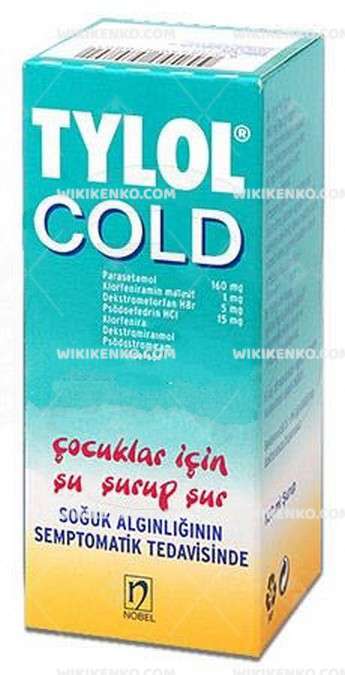Tylol Cold Syrup
Tylol Cold Syrup is a highly effective combination medicine that can alleviate the symptoms of the common cold, allergies, or flu. However, it is essential to take the recommended dosage and avoid potential drug interactions or side effects. Therefore, if you are experiencing any of the symptoms mentioned earlier, you should consult your doctor or pharmacist before taking this medication.
| Potency | 100Ml |
|---|---|
| Manufacturer | |
| Origin | |
| Generic Name (Ingredient) | Each Scale (5 Ml Syrup) Contains 15 Mg Of Pseudoephedrine Hydrochloride, 1 Mg Of Chlorpheniramine Maleate, 5 Mg Of Dextromethorphan Hydrobromide And 160 Mg Of Paracetamol. |
Assuming your emergency circumstances for this product, visit Urgent Quotation page. Besides, for any pharmaceutical questions, please ask us in the comments section.
Description
Ingredients
Tylol Cold Syrup contains four active ingredients that work together to relieve multiple symptoms:
Acetaminophen – a pain reliever and fever reducer
Dextromethorphan – a cough suppressant that affects the signals in the brain that trigger cough reflex
Guaifenesin – an expectorant that helps loosen congestion in your chest and throat, making it easier to cough out through your mouth
Phenylephrine – a decongestant that shrinks blood vessels in the nasal passages. Dilated blood vessels can cause nasal congestion (stuffy nose)
Warnings and Precautions
Before taking Tylol Cold Syrup, there are some important things to keep in mind. First, do not use this medicine if you have taken an MAO inhibitor in the past 14 days. A dangerous drug interaction could occur. MAO inhibitors include isocarboxazid, linezolid, phenelzine, rasagiline, selegiline, and tranylcypromine.
Additionally, it’s important not to take more than the recommended dosage of Tylol Cold Syrup. An overdose of acetaminophen can damage your liver or cause death. If you experience nausea, pain in your upper stomach, itching, loss of appetite, dark urine, clay-colored stools, or jaundice (yellowing of your skin or eyes), call your doctor at once.
In rare cases, acetaminophen may cause a severe skin reaction. If you experience skin redness or a rash that spreads and causes blistering and peeling, stop taking this medicine and call your doctor right away.
Other Side Effects
While Tylol Cold Syrup can provide relief for multiple symptoms, it may also cause some side effects. Common side effects may include dizziness, drowsiness, dry mouth, nose or throat, blurred vision, constipation, feeling restless or excited (especially in children), or sleep problems (insomnia). If any of these effects last or get worse, contact your doctor or pharmacist promptly.
It’s important to note that this is not a complete list of side effects, and others may occur. Call your doctor for medical advice about side effects.
Conclusion
Tylol Cold Syrup can be an effective solution for relieving the symptoms caused by colds, flu, or allergies. However, it’s important to follow the recommended dosage and be aware of any potential drug interactions or side effects. If you have any concerns or questions about taking Tylol Cold Syrup, talk to your doctor or pharmacist.
Use the form below to report an error
Please answer the questions as thoroughly and accurately as possible. Your answers will help us better understand what kind of mistakes happen, why and where they happen, and in the end the purpose is to build a better archive to guide researchers and professionals around the world.
The information on this page is not intended to be a substitute for professional medical advice, diagnosis, or treatment. always seek the advice for your physician or another qualified health provider with any questions you may have regarding a medical condition. Always remember to
- Ask your own doctor for medical advice.
- Names, brands, and dosage may differ between countries.
- When not feeling well, or experiencing side effects always contact your own doctor.
Cyberchondria
The truth is that when we’re sick, or worried about getting sick, the internet won’t help.
According to Wikipedia, cyberchondria is a mental disorder consisting in the desire to independently make a diagnosis based on the symptoms of diseases described on Internet sites.
Why you can't look for symptoms on the Internet
If diagnoses could be made simply from a textbook or an article on a website, we would all be doctors and treat ourselves. Nothing can replace the experience and knowledge of specially trained people. As in any field, in medicine there are unscrupulous specialists, differences of opinion, inaccurate diagnoses and incorrect test results.






Reviews
There are no reviews yet.